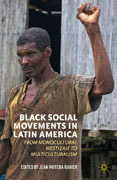
Black social movements in Latin America: from monocultural mestizaje to multiculturalism
Rahier, Jean Muteba
This collection of essays aims to explore the transformations of the political landscapes within which Afro Latino social movements have been operating since the end of the 1970s. It is premised on the assertion that, distinctively in different national contexts, the major characteristic of these transformations has been the ideological alteration of the official narrative of national identity through the passage from 'monocultural mestizaje' and 'invisibilization' of Afro Latinos organized by the state and other dominant social actors to multiculturalism and state corporatism/cooptation. Every individual essay emphasizes the processes that led to the emergence of state corporatism/cooptationof Afro Latinos and their consequences on Afro Latino social movements. As many of the contributions show, these new situations have rendered Afro Latino political struggles more complex. Sometimes, as in the case of the Pacific Lowlands of Colombia, they have heightened to new levels of aggressiveness dominant socio-political actors' antagonism towards them. INDICE: Introduction: Black Social Movements in Latin America: From Monocultural Mestizaje and 'Invisibility' to Multiculturalism and State Corporatism/Cooptation - .J.M.Rahier.PART I: SETTING UP THE STAGE.Afro In/Exclusion, Resistance, and the 'Progressive' State: (De)colonial Struggles, Questions, and Reflections - C.Walsh.International Organizations and the Human Rights of Afro Latin Americans: The Case of UNESCO - P.M.Fontaine.PART II: A FOCUS ON CENTRAL AMERICA.Garifuna Activism and the Corporatist Honduran State since the 2009 Coup - M.Anderson.The Afro-Guatemalan Political Mobilization: Between Identity Construction Processes, Global Influences, and Institutionalization - C.Agudelo.PART III: A FOCUS ON THE ANDEAN REGION.The Quest for a Counter-Space in the Colombian Pacific Coast Region: Towards Alternative Black Territorialities or Cooptation by Dominant Power? - U.Oslender.Multicultural Politics for Afro-Colombians: An Articulation 'Without Guarantees' - R.Cardenas.The Afroecuadorian Social Movement: Between Empowerment and Cooptation - .C.Torre. & .J.A.Sanchez.Does 'Still Relatively Invisible' Mean 'Less Likely to be Co-opted'? Reflections on the Afro-Peruvian Case - S.Greene.Interview of MarÃa Alexandra Ocles Padilla, Former Minister, SecretarÃa de Pueblos, Movimientos Sociales y Participación Ciudadana, Ecuador - .J.M.Rahier. & .M.Prosper.PART IV: A FOCUS ON THE BRAZILIAN EXPERIENCES.State and Social Movements in Brazil: An Analysis of theParticipation of Black Intellectuals in State Agencies; .C.B.R. - .Silva.Fromthe Black Councils to the Federal Special Secretary for the Adoption of Policies that Promote Racial Equality (SEPPIR): New Identities of the Black Brazilian Movement - J.Silva.Interview of Maria Inês Barbosa, Former Vice-Minister, Secretaria Especial de PolÃticas de PromoÃoÃúo da Igualdade Racial (SEPPIR), Brazil - J.M.Rahier.
- ISBN: 978-0-230-39360-8
- Editorial: Palgrave Macmillan
- Encuadernacion: Cartoné
- Páginas: 272
- Fecha Publicación: 22/06/2012
- Nº Volúmenes: 1
- Idioma: Desconocido
